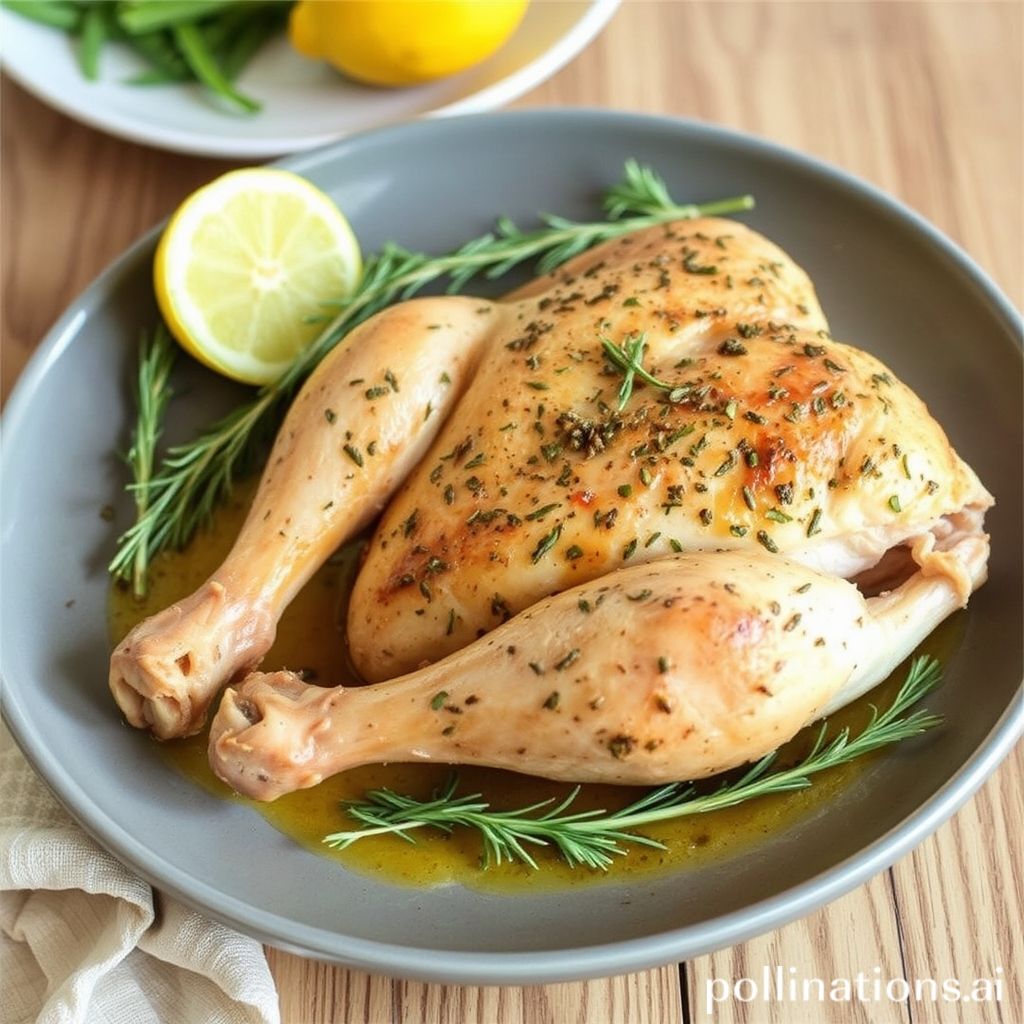Table of Contents
- Introduction
- Choosing the Right Chicken: Whole or Parts
- Essential Ingredients: Lemon, Fresh Herbs, and Garlic
- Preparation Steps: Marinating and Seasoning
- Roasting Techniques for Perfectly Cooked Chicken
- Side Dishes that Complement Lemon Herb Roasted Chicken
- Tips for Carving and Serving
- Storing and Reheating Leftovers
- Popular Variations and Recipe Twists
- Conclusion
- Frequently Asked Questions
Introduction
Unlock the secret to culinary excellence with our Lemon Herb Roasted Chicken recipe. This is not just any roasted chicken; it’s a symphony of flavors crafted to perfection with the finest ingredients. Imagine succulent, juicy meat infused with the zestiness of lemon and the vibrant aroma of fresh herbs. This masterpiece is perfect for a cozy family dinner or an impressive holiday feast.
Here’s what you’ll need:
- 1 whole chicken (about 3-4 pounds)
- 2 lemons, thinly sliced
- 4 cloves garlic, minced
- 1/4 cup fresh rosemary, chopped
- 1/4 cup fresh thyme, chopped
- 1/4 cup olive oil
- Salt and pepper to taste
Choosing the Right Chicken: Whole or Parts
When it comes to making Lemon Herb Roasted Chicken, choosing the right type of chicken is essential for achieving the desired flavor and texture. There are two primary options to consider: whole chicken or chicken parts. Each has its unique advantages and considerations.
Using a whole chicken can be cost-effective and offers an impressive presentation for a dinner party or family meal. It also allows for a more even distribution of flavors, especially when stuffing the cavity with herbs, lemon, and garlic. However, cooking a whole chicken takes longer, and ensuring that both the white and dark meat are cooked perfectly can be challenging.
On the other hand, using chicken parts such as breasts, thighs, or drumsticks can provide more convenience. These pieces cook faster and can offer more versatility in preparation and serving sizes. Chicken breasts are leaner and take well to marinating, while thighs and drumsticks provide richer flavors and juicier meat. Selecting the right parts can help tailor the dish to your personal preferences and dietary needs.
Ultimately, the choice between a whole chicken and parts depends on your specific cooking goals, time constraints, and the preferences of those you are serving.
Essential Ingredients: Lemon, Fresh Herbs, and Garlic
To create a perfect Lemon Herb Roasted Chicken, certain ingredients are essential. The first and most prominent is lemon. Lemons add a zesty flavor and their acidity helps tenderize the chicken, ensuring a juicy and flavorful result. The citrusy aroma also complements the savory elements of the dish.
Another critical component is fresh herbs. Fresh rosemary, thyme, and parsley are commonly used. These herbs infuse the chicken with their aromatic oils, adding depth to the flavor profile. The freshness of the herbs is key; dried herbs simply do not provide the same intensity of flavor or aroma.
Garlic, often considered a staple in many cuisines, is another indispensable ingredient. Roasting garlic mellows its pungency and brings out a sweet, nutty flavor that pairs beautifully with the lemon and herbs. Crushed garlic cloves can be inserted under the chicken’s skin or scattered around the roasting pan to ensure an even distribution of flavor.
Combining these ingredients—lemon, fresh herbs, and garlic—creates a harmonious blend of flavors that elevate a simple roasted chicken into an exceptional culinary experience. Each ingredient plays a crucial role in achieving the perfect balance of taste and aroma.
Preparation Steps: Marinating and Seasoning
The first step in preparing a delicious Lemon Herb Roasted Chicken is marinating and seasoning. Begin by preparing a flavorful marinade. You will need fresh lemon juice, olive oil, minced garlic, chopped fresh herbs such as rosemary, thyme, and parsley, salt, and black pepper. Mix these ingredients in a bowl to form a well-balanced marinade.
Next, take the whole chicken and pat it dry with paper towels to ensure the marinade adheres well. Place the chicken in a large, resealable plastic bag or a shallow dish. Pour the marinade over the chicken, ensuring it is well-coated. Seal the bag or cover the dish and refrigerate it for at least two hours, but preferably overnight. The longer the marinating time, the deeper the flavors will penetrate the meat.
When ready to cook, remove the chicken from the marinade and let it sit at room temperature for about 30 minutes. This helps in even cooking. Preheat your oven to the desired temperature. If you want extra flavor, you can stuff the chicken cavity with lemon wedges, garlic cloves, and additional herbs before roasting. Finally, season the outside of the chicken with a little extra salt and pepper to enhance the savory taste.
Roasting Techniques for Perfectly Cooked Chicken
Roasting a chicken to perfection requires a combination of the right techniques and a keen eye for detail. Start by preheating your oven to 375°F (190°C). Before placing the chicken in the oven, ensure it is properly seasoned. A mix of salt, pepper, lemon zest, and herbs such as rosemary and thyme can elevate the flavors significantly.
Pat the chicken dry with paper towels to ensure a crispy skin. Drizzle olive oil over the chicken and rub it in to help the seasoning adhere and to promote browning. Use a roasting rack inside your roasting pan to allow for even air circulation and to prevent the bottom of the chicken from becoming soggy.
Roasting time is crucial. As a rule of thumb, roast the chicken for about 20 minutes per pound. However, the most reliable way to ensure your chicken is perfectly cooked is to use a meat thermometer. Insert it into the thickest part of the thigh; the internal temperature should read 165°F (75°C). Let the chicken rest for at least 10 minutes before carving to allow the juices to redistribute, resulting in a moist and flavorful meal.
Side Dishes that Complement Lemon Herb Roasted Chicken
Lemon Herb Roasted Chicken is a delightful dish that pairs well with a variety of side dishes. One excellent complement is a serving of roasted vegetables. The combination of carrots, potatoes, and bell peppers, drizzled with olive oil and seasoned with salt and pepper, adds a colorful and nutritious element to the meal.
Another great option is garlic mashed potatoes. The creamy texture and rich garlic flavor provide a satisfying contrast to the zesty lemon herb chicken. Additionally, a fresh green salad with a light vinaigrette dressing can add a refreshing touch.
For those who enjoy grains, consider serving a quinoa or couscous salad with chopped tomatoes, cucumber, and a hint of mint. The light and fluffy grains absorb the flavors well and provide a nice balance to the roasted chicken. Orzo pasta with cherry tomatoes and basil is another wonderful side that pairs nicely, offering a Mediterranean flair.
Remember, the key is to choose side dishes that enhance and complement the flavors of the lemon herb roasted chicken. Whether you prefer vegetables, grains, or salads, there are plenty of delicious options to create a well-rounded and satisfying meal.
Tips for Carving and Serving
Carving and serving your Lemon Herb Roasted Chicken correctly can make all the difference in presentation and taste. Start by letting the chicken rest for about 15 minutes after removing it from the oven. This allows the juices to redistribute, making the meat more succulent. Place the chicken on a sturdy cutting board, preferably one with a groove to catch any juices.
Begin by removing the legs. Hold one leg with a fork and cut through the skin between the leg and the body. Gently pull the leg away from the body and cut through the joint to fully detach it. Repeat on the other side. Next, remove the wings in a similar manner. Now, it’s time to carve the breast. Make a deep, horizontal cut along one side of the breastbone and slice down vertically to remove the entire breast half. Repeat on the other side, slicing the breast meat into even pieces.
Arrange the carved pieces on a serving platter, including both white and dark meat for variety. Garnish with extra lemon slices and fresh herbs for a beautiful presentation. Serve alongside your favorite side dishes and enjoy the fruits of your labor.
Storing and Reheating Leftovers
Storing and reheating leftovers of your Lemon Herb Roasted Chicken is simple and can ensure that you enjoy your meal again with the same delightful flavors. First, allow the chicken to cool completely before storing it. You can store the chicken in an airtight container or tightly wrapped in aluminum foil or plastic wrap. It is best to consume the leftovers within 3 to 4 days to ensure freshness and safety.
For reheating, the oven is a great option to maintain the chicken’s juicy texture. Preheat your oven to 350°F (175°C). Place the chicken in an oven-safe dish and cover it with foil to retain moisture. Heat for about 20 minutes or until the internal temperature reaches 165°F (74°C). If you’re in a hurry, you can use a microwave, though this may result in a slightly drier texture. Place the chicken on a microwave-safe plate, cover it with a microwave-safe lid or another plate, and heat on medium power for 2-3 minutes, checking for doneness halfway through.
By following these steps, you can enjoy your Lemon Herb Roasted Chicken leftovers while preserving their delicious taste and texture.
Popular Variations and Recipe Twists
When it comes to Lemon Herb Roasted Chicken, there are numerous popular variations and recipe twists that add an exciting dimension to this classic dish. One common variation is to marinate the chicken in a mixture of Greek yogurt, lemon zest, and a blend of Mediterranean herbs like oregano and thyme. This not only tenderizes the meat but also infuses it with deep, tangy flavors.
Another favorite is to add garlic and honey to the lemon herb mixture, creating a sweet and savory coating that caramelizes beautifully during roasting. Adding root vegetables like carrots, potatoes, and onions to the roasting pan is another excellent way to create a one-pan meal that’s deliciously infused with the flavors of the chicken and herbs.
For a more exotic twist, try incorporating Middle Eastern spices such as cumin, coriander, and sumac to the rub. These spices add a unique depth and aromatic intensity to the dish. Stuffing the chicken cavity with fresh herbs, lemon wedges, and even a few cloves of garlic can also enhance its flavor profile.
These variations not only keep the dish interesting but also allow cooks to experiment with different flavor combinations, making Lemon Herb Roasted Chicken a versatile and ever-delightful meal.
Conclusion
Mastering the art of Lemon Herb Roasted Chicken is a culinary journey that promises juicy and flavorful results with every bite. From selecting the right chicken and essential ingredients to impeccable preparation and roasting techniques, this recipe offers a delightful experience for any home cook. The versatility in side dishes, carving tips, and clever variations ensure that each meal feels unique and special.
Ready to elevate your chicken recipes even further? Don’t miss out on The Chicken Bible: Say Goodbye to Boring Chicken with 500 Recipes for Easy Dinners, Braises, Wings, Stir-Fries, and So Much More. Discover a treasure trove of delicious possibilities that will make every chicken dish a memorable feast. Click here to purchase your copy and transform your kitchen adventures today!

